Armageddon, 1998, directed by Michael Bay, screenplay by Jonathan Hensleigh and J. J. Abrams, adaptation by Tony Gilroy and Shane Salerno, story by Robert Roy Pool and Jonathan Hensleigh (I have no idea what work those writing credits actually correspond to).
Armageddon seems like an odd choice for a Criterion edition, but if the collection is intended to provide a representative sample of film throughout history, neglecting the late-90's studio system would be silly. If you're one of the three people who didn't see it, it was pitched as "Red Adair in space," and later as "The Dirty Dozen in space." The basic story (and it is the most basic of stories) is that a gigantic asteroid is on a collision course with earth, and NASA sends a group of twelve oil-drillers into space to plant a nuclear bomb that will destroy the asteroid and save the planet. Here they are in full The Right Stuff-hero-mode (which is the only mode they've got):
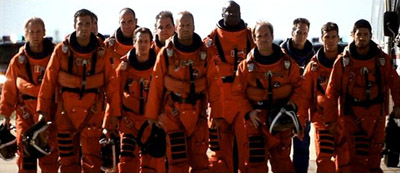
Armageddon exemplifies a certain type of movie; the big, dumb, loud, critic-proof summer blockbuster. This sort of disaster movie is still around, but it's evolved a lot in the last seven years. The closest thing to Armageddon this summer was War of the Worlds, which is a much more thoughtful movie. Here's why:
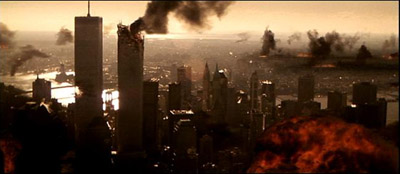
New York, post meteor shower.
The destruction of American cities is no longer a guilt-free pleasure. There's a reason that The Onion namechecked producer Jerry Bruckheimer when they wrote this, and Armageddon is his masterpiece. Watching it now, you see so many scenes that simply could not be made today, or even conceived of, and for me that made rewatching it oddly poignant. The men and women who worked on the film were certain that they were living at the end of history. Too bad it didn't work out that way.
Critics who thought Armageddon was a sort of terminal end point for filmmaking (which is to say, all of them except David Edelstein, as far as I can tell) missed the point. Janet Maslin, for example, wrote, "Armageddon tries to tell a coherent story of guts, young love and space travel." But I don't think it does try; it's not really interested. You wouldn't criticize Star Tours or Batman: The Ride for shoddy characterization or wooden acting, and it doesn't seem fair to me to treat movies like Armageddon as though their writers and directors had the same goals as, say, Tarkovsky. David Foster Wallace put it best (in "David Lynch Keeps His Head"):Art film is essentially teleological; it tries in various ways to "wake the audience up" or render us more "conscious." (This kind of agenda can easily degenerate into pretentiousness and self-righteousness and condescending horsetwaddle, but the agenda itself is large-hearted and fine.) Commercial film doesn't seem like it cares much about the audience's instruction or enlightenment. Commercial film's goal is to "entertain," which usually means enabling various fantasies that allow the moviegoer to pretend he's somebody else and that life is somehow bigger and more coherent and more compelling and attractive and in general just way more entertaining than a moviegoer's life really is. You could say that a commercial movie doesn't try to wake people up but rather to make their sleep so comfortable and their dreams so pleasant that they will fork over money to experience it – the fantasy-for-money transaction is a commercial movie's basic point. An art film's point is usually more intellectual or aesthetic, and you usually have to do some interpretative work to get it, so that when you pay to see an art film you're actually paying to work (whereas the only work you have to do w/r/t most commercial film is whatever work you did to afford the price of the ticket).
Some movies blur those distinctions (all of the studio products so far in the Criterion Collection, for example), but Armageddon may be the most commercial film ever made. And I mean that in every sense of the word commercial; Roger Ebert called it "the first 150-minute trailer." Michael Bay and his cinematographer John Schwartzman made the jump from advertising to features, and they brought that sensibility with them. What you get is perfect framing, beautiful photography, but what's actually on-screen is pure wish-fulfillment in a way that's completely divorced from narrative. Like this:

That's the end shot of a love scene between Ben Affleck and Liv Tyler. It's lovely, but it doesn't have any basis whatsoever in reality. Where is the house they've driven to? Does it belong to either character? Why have they strung Christmas lights in the tree? When did they do this? Are we really meant to believe that A.J., a roughneck who works on oil rigs, drives a cute little BMW Z3 when he's on dry land? You can take nearly any frame in this movie and pick it apart in this way, but that presupposes that the goal of this film is to tell a story, and I don't think that's true. The story is a vehicle for the wish-fulfilment you're paying for; when it's in the way, it's jettisoned. This shot does exactly what it sets out to in terms of the mood it evokes in the viewer. It's not a subtle emotion, it's not a subtle shot, and it's not a "justified" shot in any way, shape, or form. But as fantasy, it's great; it's the world advertising has always promised us. (And, of course, it is advertising: BMW paid a good deal of money to have A.J. drive such an unlikely car).
The point is, that shot succeeds brilliantly at "enabling various fantasies that allow the moviegoer to pretend he's somebody else and that life is somehow bigger and more coherent and more compelling and attractive and in general just way more entertaining." So does the rest of the movie. Seen from those terms, all the laughably absurd plot points and continuity errors in the world don't really matter. So the movie takes place in a world without time zones, in which it's simultaneously daylight in India, New York, and Paris; so what? You think Bruce Willis has time to keep track of time zones when humanity's future is at stake? Here's a single tear for narrative coherence:
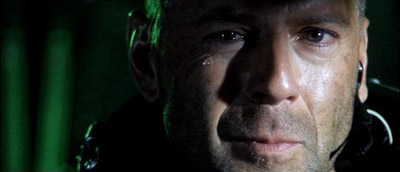
Now if you'll excuse me, I've got a planet to save.
There's another reason Armageddon specifically belongs in a collection like this one: thanks to Top Gun, Jerry Bruckheimer was able to get the crew unbelievable access to NASA facilities during the filming of this movie. So there are shots and sequences that are completely unprecedented, and sheer techno-pornography for someone who, like me, grew up in love with the space program. (Let me put it this way: at age 6, I had a record of radio highlights from the first Columbia launch). Except for mission control, most of the NASA facilities you see in the movie are the real thing, from the vacuum chambers to the shuttle assembly building to the neutral buoyancy pool. Ben Affleck and Bruce Willis became (and remain) the only two civillians to ever wear real space suits for the underwater sequences. This shot isn't faked or altered in any way; that's the cast of the movie on the real gantries with the real shuttle, a few days before a real launch:
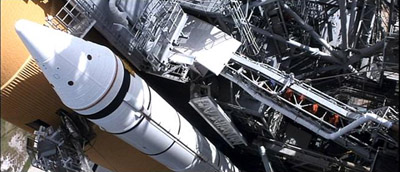
And could there be anything hotter than making out in one of the rocket exhaust cones of the Saturn V booster?
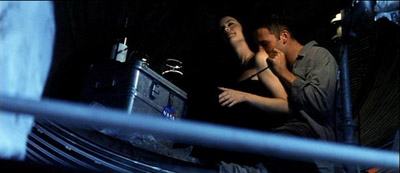
Of course, my own weird space-nerd childhood doesn't really have a bearing on the movie for most people. But it is valuable to see an example of the sort of filmmaking excesses that can result when a filmmaker is allowed to have anything he wants. For example, there's a scene where William Fichtner briefs the crew. In the real world, this would probably happen in a briefing room. Michael Bay decided he wanted it to happen in the shuttle assembly building with a B-2 and 2 SR-71 Blackbirds. So the Air Force flew in the planes, asked him where to park them, and this is the result:
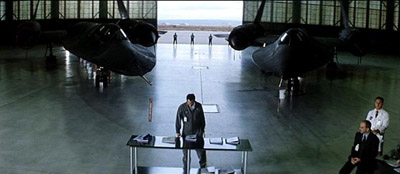
You can't see the B-2 in this shot because it's parked over to the left. It had to be there, because both the engine exhaust and the trailing edge of the wing were classified at the time and could not be photographed. When you see the movie notice that the tail end of the plane is always out of frame. In fact, the crew wasn't allowed to see the back end of the plane at all. Which is to say that Jerry Bruckheimer is able to get the Air Force to risk national security to indulge his director's whims. That sort of excess is unparalleled in film history. And it actually doesn't make me too happy with the Air Force, because, after all, I paid for part of the production of Armageddon, as did most of you. Without any back-end participation at all.
The level of personal wish fulfilment in Armageddon is pretty easy to pick out; it's worth noting that Michael Bay also sells a kind of national wish fulfilment. Armageddon has a serious hard-on for the early days of the space program, specifically for the sense of national purpose it gave the country. In fact, the movie suggests that that America, that national conception of ourselves, is still pretty much what we are, as you can see below. Show these four frames to someone who doesn't know what they're from and ask them what year each one depicts:
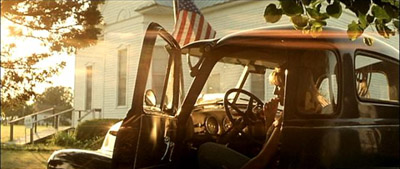
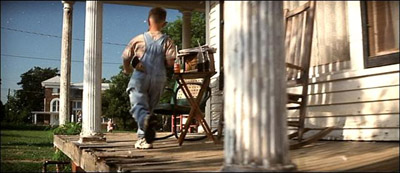
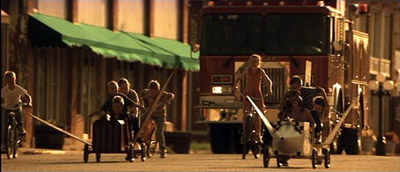

My guess is nobody says 1998 for any of them. Note the NASA hero-worship in the third frame; here's a close-up of one of the soapbox derby cars:
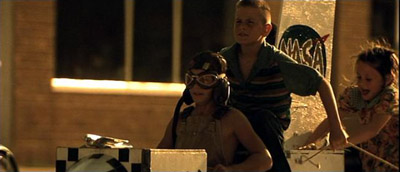
When's the last time you saw a kid with a helmet like that, much less a soapbox derby car? The more observant among you will have also noticed that the last still quotes this photograph from Robert Frank's The Americans:
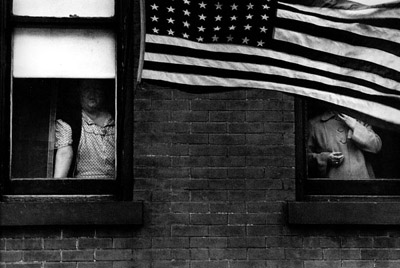
That photo was taken in the early fifties, before Sputnik, and definitely falls under "American mythmaking" (put it this way, Jack Kerouac wrote the introduction to the collection). None of the above is subtle, but here's maybe the most blantantly manipulative shot in the film:

In case you miss it, this shot is immediately followed by one of the astronauts saying "Kennedy, we see you. And you never looked so good!" Of course, he's talking about the Kennedy Space Center...or is he? The point is, these sections are shamelessly manipulative and there's nothing delicate about them. Nevertheless, they have an elegiac tone that's more moving than anything else in the movie. And they seem motivated by a genuine longing for a national purpose, and national heroes, for a more innocent version of America. Of course, that America never really existed, and Armageddon offers Bruce Willis as just the sort of national hero we're looking for, but hey, you take your pleasures where you find them. If you're willing to let go of outdated values like "coherence" and "narrative," you'll find plenty to love in Armageddon.
Randoms:
- If you want to piss off a DP, make him shoot space helmets that expose the whole face. There's nowhere to hide a light (notice how much of the face is covered in the helmets in movies like Alien), which means you have to light them from outside the helmet, which means reflections. John Schwartzman eventually came up with the solution of sticking a light on top of every helmet, so that when you saw reflections of lights in every shot, you would at least think they were coming from another astronaut's headlight and not from a film crew. Here are the helmets:
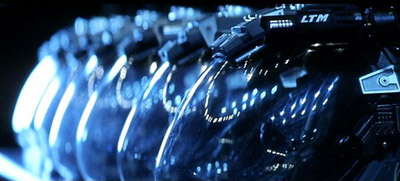
- Disney's marketing campaign for Armageddon is a story in and of itself. A few highlights:
- 50 minutes of the film was shown at Cannes to laughs and catcalls. After the screening, Bruce Willis gave the most hostile press conference of his career, berating the assembled foreign journalists for their reaction to the movie.
- This was the second asteroid movie that summer; the first was Deep Impact. Disney thought its only real competition was Godzilla, however, and that's why there's an early scene of a toy dog mauling a Godzilla doll (N.B.: those scenes feature a dog that had been specifically trained to attack Godzilla dolls!).
- Commercials for the movie, including the Superbowl spot, are included on the disc. I thought it was incredible how primitive they seemed compared to ads for movies right now. But I suppose they seemed primitive at the time, too.
- 50 minutes of the film was shown at Cannes to laughs and catcalls. After the screening, Bruce Willis gave the most hostile press conference of his career, berating the assembled foreign journalists for their reaction to the movie.
- This is a more religious movie than any other action film I can think of. Characters are continually invoking God and praying. Like the shots of a non-existant small-town America, this is described on the commentary track as an entirely cynical ploy to attract people from flyover country. Given the amount of contempt most studios have for the intelligence of moviegoers in red states, it's strange to me that this particular cynical ploy isn't used more often. If you have any doubt about Hollywood studio executives' feelings about the middle of the country, let me put it this way: a few months ago I saw a memo from a well-respected producer to a well-respected studio executive in which he argued that a director who both men thought was out-of-touch and past his prime would be perfect for a particular project, because only someone out-of-touch could make a movie simple enough for moviegoers in the middle of the country to relate to. This is not, by a long shot, the worst example of this sort of thing, and if I ran a studio it'd be the first thing I'd ban; if executives made movies they actually wanted to see, I think the world would be a better place. Note also that when I say "studio executives," that's who I mean, not filmmakers and not some nebulous idea of "liberal Hollywood."
- Watch for a nice cameo by Udo Kier, star of Blood for Dracula and Flesh for Frankenstein. He plays the psychologist who has to analyze the astronauts to be. For reasons only he can explain, Michael Bay chose to set these scenes in a parody of a soundproof room with spiked walls:
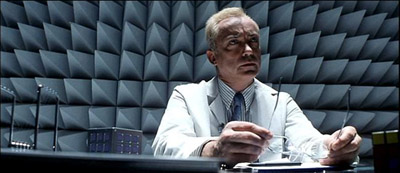
-
It's-a me! Dracula!
- Armageddon does cheat on at least one NASA location; Mission Control. Here's the film's version:
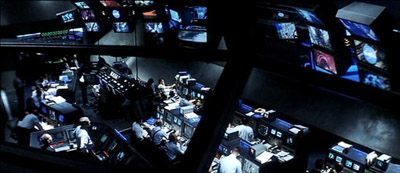
- And here's the real thing, also in the film:
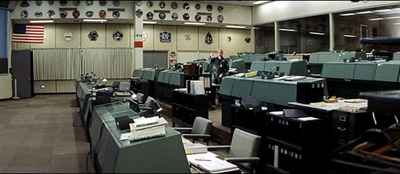
- You can't make him out, but that's Owen "Butterscotch Stallion" Wilson goofing around in the old mission control. Despite looking like a community college classroom, that's where they ran the moon landings.
- There are some excellent features about the special effects. The most surprising is this shot of the destruction of Paris:
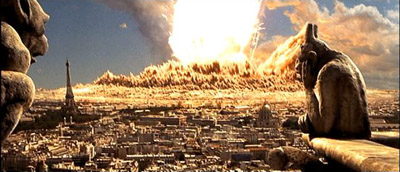
- I always assume shots like this are completely CGI (and today they probably would be), but in fact only the overlay of the Paris streets below is CGI. The gargoyles are a real shot, and the blast circle approaching camera was made by photographing a real explosion of nearly 50 concentric circles of explosive buried several feet under dirt.
- Although Robert Towne supposedly did some polish work on this script, Steve Buscemi contracts "space dementia" at a certain point in this movie, for no apparent reason, and with no real consequences. I just thought that should be clear at the outset if you're planning on watching it for the quality of the writing.
- There's an entire commentary track with the "science advisors," a NASA employee and a former astronaut, who tried to make the movie as scientifically accurate as possible. Listening to these guys talk about their constant battles to get Michael Bay and company to make the film at all relate to the world of science (for example, when Mir explodes, it explodes, like it's in an atmosphere) is a case study in cognitive dissonance.
- The Armadillo, the drill car they drive around on the asteroid, has a chin mounted chain gun. You might wonder when NASA started putting weapons on their vehicles, or what they were expecting to shoot at on an asteroid, or even how they expected bullets to fire in a vacuum. But in fact, this wasn't NASA's decision so much as Mattel's; there was a toy version of this car, and toys with guns sell better. I'm not kidding; plot points were decided on by the toy company.
- Manny Perry, the guy who was the MPAA's copyright spokesman for a few glorious months, did some of the stunts in this. I can't begin to tell you how delighted I was to see his name in the credits.
- Like I said, the NASA sets were mostly real. Ben Affleck's teeth? Not so much. And I wouldn't put money on Tom Cruise's. Here's Michael Bay talking about working with Affleck on the commentary track:
I had him work out. We paid for a set of twenty thousand dollars of pearly white teeth—Ben's gonna hate that story—uh, I always like low shots that kinda come right under your chin, just make you a little bit heroic, and he kinda had these baby teeth. So, uh, I told Jerry Bruckheimer, I said, "God, he's got these baby teeth, Jerry, I don't know what to do." Jerry used a very famous star in a... plane movie that he replaced teeth with so, uh, he says, "We did it to him, why not do it to Ben?" So my dentist had Ben sitting in a dentist's chair for a week, eight hours a day.
- If you develop over 1,000,000 feet of Kodak film on a single production, Kodak sends you a gift basket with six bottles of Korbel. Michael Bay complains on the commentary that they could have sent two bottles of Dom Perignon for the same money. So, Kodak, if you haven't sent out those gift baskets for The Island yet, take note.
Armageddon was a nice break from my self-planned crash course in foreign and art house film. Now it's back to movies with a little more on their mind. At least until I get to The Rock.


49 comments:
This is without a doubt the best answer to the "What the hell is Armageddon doing in the Criterion Collection?" question I've seen.
Excellent analysis of the movie. I'm not ashamed to have it on my shelf... hell, I own Smokey and the Bandit III.
Loved the review (as always), but have one quibble - Deep Impact was about a comet, not an asteroid. However, your intended point about the public blurring the two movies due to the common "End of the World As We Know It" themes.
...err... the intended point stands...
Jim, thanks! You know, I was thinking the other day about the money spent on Armageddon, and it's ridiculous to think how many of the other movies in the Criterion Collection you would have to add up the budgets of to get close to its cost. So if you went to a studio executive and said, you know, you can make Armageddon or The 400 Blows, Beauty and the Beast, The Killer, Hard Boiled, and the next twenty titles in the collection, the executive would choose Armageddon. Worst of all, from an economic standpoint (which is to say, from the standpoint that we as moviegoers encourage him to take by putting down our money for tickets), he'd be correct, at least in the short term (the value of having a deep DVD library to relicense might ultimately be more valuable, but only after quite a long time).
I have long thought that Smokey and the Bandit III deserved a full restoration and multiple DVD set.
Jody, thanks. You're right, of course, about it being a comet in Deep Impact. In my defense, I last saw Deep Impact during its theatrical run, and Peter Bart makes the same mistake in The Gross consistently, e.g. on p. 39, "...both films spring from roughly the same premise: An asteroid soaring through space threatens the existence of the earth." I don't think he ever refers to it as a comet. Also, Armageddon is, not too surprisingly, a bit unclear on what exactly is threatening earth: they call it a comet at least once, and it's labeled "Rogue Comet" on a video presentation NASA makes.
What kind of a setup do you use to get the stills from the movies?
Intervideo WinDVD 6 has a still capture feature that outputs JPEGs. Then I crop them in photoshop (for non-anamorphic releases that aren't 1.33:1), drop them to 400 pixels wide (standard DVD image is 640x480) in an attempt to keep the right hand column from getting pushed to the bottom of the page, and voila.
I came across your blog via defamer. I admit to being completely obsessed with the relative "stupidity" of Michael Bay. I'm amazed everytime I see one of his movies and hear he's grossed some obscene amount of money. I watched the Island long after it tanked on video to ensure as little of my dollars snuck through my fingers into his hands.
This analysis of Armageddon has put me back on the trail! I have to hear the commentary of the scientists trying to explain that pesky little thing called reality to Michael Bay and company.
Thank you for such a great blog. It has not encouraged me start a film blog (like some other comments) because I'm smart enough to appreciate when someone has something intelligent to say about it, but not really smart enough to figure it out myself. I've gone through your archives and found quite a few films I want to see. And now I may just watch them intelligently.
Joseph, thanks for the kind words, and I'm glad to hear you're going to seek out some of these movies. I haven't regretted spending time seeing any of them so far. The scientist commentary track on Armageddon is really worth listening to. Re: The Island, I haven't seen it yet; I read and liked the script, but the trailers contained a bunch of dialogue that wasn't in the script (and was excruciatingly bad), so I decided to pass. Worthwhile?
Can you define worthwhile? Armageddon played into my preconceived notions of the America that our collective conciousnees is nostalgic for. I hated the movie because of the points you made like lack of storyline or making much sense. But,I would watch it again in a second, shed tears when I was supposed to, and probably even pump in victory at the end of the movie because of the good ol' USA coming through. Take out those underlying American themes and the movie has lost its one thread of cohesion.
The Island is a movie without this cohesion. The story is loose and since I was not blind sided with patriotism, I was left scoffing and laughing at the unbelievability of it. Why do NASA vehicles have machine guns attached to them in space you ask? I don't care because I'm sure we needed them to kick some asteroid ass to save the world. However, in the Island I do care that the two leads just fell 50 stories onto a net and stand up unscathed while a black man says "Goddamn, you are the two luckiest sonbitches I've ever seen" or some other standard Martin Lawrence style speak. How did they fall and not get hurt? Was that seriously how they got away for the moment? Slap an American flag on their outfits or tell me its for national security and I'm puddy. Without it though, I'm left wondering as to how believable it is. The island is worthwhile like the movie papparazzi was worthwhile. I watched because I couldn't believe it could get worse. And everytime I thought the movie had reached a new low, there was another plot twist that made it sink farther.
I'm interested to know what was good about the script, because the dialogue in the movie was horrendous. Its initially what turned me off to the movie. Ewan McScottish alliterates for the first third of the movie and he begins to question his reality because he doesn't get the breakfast items he asks for in the morning. Compelling, I know. So compelling, infact, that I likened him to Winston in 1984 for figuring out that something is not right simply by not receiving bacon for breakfast (alliteration #3).
On a side note, the "Los Angeles" scenes in movie were mostly filmed in Detroit. As an LA native, that fact alone makes me want to choke Michael Bay out.
And wasn't there a Simpsons episode that collected all the weirdos onto an island that had similar themes to this movie but in reverse? All I can hear is Lisa Simpson eerily saying "come join us...on the Island" right before a koala bear wearing a mask pops up at us and laughs.
I think you are onto something with space travel defining "old" America that we all relate too. Patriotism is my achilles heel in movies. I can hate a movie but be okay with it if we are spreading our American dream far and wide. Can you imagine if Independence day removed the nation building themes and was simply called Day? Thinly veiling bad sci fi movies with flags turns them into hits.
The script, at least the draft I read, didn't have a whole lot of "action movie dialogue," whereas the trailer was full of it (the thing I remember turning me off from the trailer was McGregor's immediate desire to have a car, the first time he sees one ("I don't know, but I want one," I think is the line). The script read as very creepy, like a twilight zone episode. Yeah, the science was just as bad, I'm sure, but I liked it. Oh, also, the island on the Simpsons is from the TV show "The Prisoner"--it's a prison, not an organ farm. On the larger issue that a lot of bad scifi movies wave the flag whenever they run out of ideas, yeah, for sure. I'd be curious to know what you think of Mars Attacks.
I have not seen Mars Attacks, but I believe there is more substance to the movie than bad sci fi coupled with american flags? I was under the impression that it was a parody? I've never really thought about communicating what it is about movies like The Island that I do not like until recently. I refer you to the Defamer link http://www.defamer.com/hollywood/jerry-bruckheimer/misidentifying-jerry-152080.php describing the NY post article in which a woman at a party repeatedly misidentifies Jerry Bruckheimer as Michael Bay. The story is amusing. I laughed as the editor of Defamer joked that the woman would never get the part in Jerry Bruckheimer's next movie as a woman being crushed by a hummer. He then writes "Sure, the scene sounds tragic, but the pathos of the moment is expertly lightened up when star Will Smith, the runaway Hummer’s intended victim, quips out of the side of his mouth, “Daaaaamn, girl. That shit is nasty!”"
I laughed because I said something similar about some black man making some Martin Lawrence style speak to the two leads of The Island. I didn't bring it up then or now to be racist, but rather to point out that these directors use stereotypes and other hooks into the American consciousness to sell their products and make money. Which is smart, but lazy. I think its funny that almost without thought I can imagine a black man talking jive after a disastrous fall or close encounter with death in an action movie. And without discussing the damage this has to race relations, its just sloppy. I can forgive a certain amount of "artistic license" towards physics, science, and stereotypes as long as it doesn't appear like I'm being taken for my 10 bucks.
Throughout The Island my girlfriend kept commenting that "in the future I guess they still drive Harleys and Chevy trucks." I was wondering who got to drive and who got to fly? Some people owned cars and others hover crafts? There were so many times where questions like this popped up as well as the "insert chase scene because the viewer is a sucker who needs some action here" also arose. It was nothing like the dialogue you described.
I guess that really has nothing to do with patriotism, but rather how cynical the director is towards his audience. Somehow it all seems connected to me, though. If I can put it in words, I will let you know.
In other news, the CNN article below would not have made sense a week ago before I started reading your blog. Thanks!
http://www.cnn.com/2006/SHOWBIZ/Movies/02/01/obit.shearer.ap/index.html
Well, the thing about Mars Attacks is that it makes fun of the way those scifi movies use patriotism as a shorthand for "reasons we should care about a badly-drawn character." So I think you might enjoy it. Re: lazy hooks into the audience's subconscious, I think religion also functions that way in Armageddon and I'm surprised it's not used that way more commonly. The interesting thing about Armageddon is that the movie's nostalgia for the American space program seemed to me to be sincere, and not cynical. Maybe that's just because I have an affinity for the space program, but I don't think so. Shooting at the Apollo I launch pad, for example, must have been a hassle to arrange, and I don't think it evokes the kind of Pavlovian response some of the lazier gestures do. But the gesture worked for me, and felt genuine.
Also, thanks for the Shearer obit; I didn't know she'd died. It wouldn't have met anything to me before I started watching these movies.
here's the most intelligent thing about your review of armageddon: your intelligence. you make armageddon almost seem like it meant to do everything it did. but again, it's only because your natural intelligence (and everyone else's) cannot stoop that low to even compute what armageddon was.
love your blog. keep it up!
Thanks! Re: Armageddon and filmmaker's intentions—I've been thinking about that a lot lately because of a comment Jeff made about Blood for Dracula. Do you think it matters whether the filmmakers meant for Armageddon to accomplish any particular goal? Or in general, what importance is the author's intention when watching a movie? I'm tempted to say it doesn't matter at all; your comment leads me to believe you see it differently. I don't think Armageddon is a good test case for this because it's not that successful (to put it mildly). But in general, do you think a filmmaker with bad intentions can luck into making a great movie? Beyond camp value?
i'd like to think that most-times the stronger will override the weak. (of course, here, we won't make the mistake of generalizing.) if a film-maker with mediocre intentions makes a great film: the film can have its merits independent of the film-maker. if a film-maker with great intentions makes a mediocre film: the film-maker still has his/her merits independent of the film. it's an ancient pondering, probably since stories began. even in literature there are studies focused on the author:work. it'll probably always be here.
i'm all for good bad flicks. sometimes you just want to sit back and let cellular or weekend at bernie's pass by on the screen. but sometimes it's not even a good bad, just a bad bad. in the case of armageddon (and from justin to kelly) it seems to assume that its viewers are fools with ten dollars to spare. so, in this case, what was the author's intention? and does it matter? finally, you can keep the merits from your vieweing of armageddon. you really made good arguments, points, observations. but that's just it. it's yours, not mike bay's, not armageddon's.
Fair enough—I actually think the Criterion Collection could benefit from a few more good bad flicks; I agree that by most standards Armageddon is a bad bad flick.
Matthew, just discovered your blog and all I've got to say is good luck and great job so far. Are you renting or buying these movies, by the way?
One thing I wanted to add to this is the possible reason behind Criterion choosing such films as Armageddon and The Rock to be a part of their collection.
I believe it has to do with these films actually bringing in profit. There isn't a big thirst for your Andrei Rubelevs or The Seventh Seals in "today's marketplace". As I write this I realize what a shame it is, but more people know who Michael Bay is than Ingmar Bergman or Tarkovsky.
So I think these two movies are a part of the Collection to "keep the collection alive", so to speak. Without it, Criterion would have not have a profit that could sustain their work.
But then again, this isn't a confirmed fact, although I remember reading about it somewhere. It does make sense though.
Anyhow, good luck and keep reviewing!
Anonymous,
Thanks! Glad you're enjoying it. I think you're right--Criterion probably makes more money on their editions of mass-market titles than the more obscure ones--I would guess, however, that they don't make as much as you might think, because with Armageddon their $35.00 edition competes with a lot of other ones, including Walt Disney Video's version at $9.99. I'd bet their biggest profits come from Wes Anderson's films—the only available DVDs of The Royal Tenenbaums and The Life Aquatic with Steve Zissou are the Criterion ones. That probably pays for a lot of Tarkovsky...
(Of course, I bet Buena Vista Home Entertainment gets a big bite of any Wes Anderson DVDs, so maybe it's a wash).
A great review, I have watched this film several times (against my better judgment), and believe it plays better if you think of it as a sly comedy rather than a serious piece.
Also, thanks for finally clearing up why that chain gun exists. That has always bothered me.
Andrew,
Thanks for the kind words. Re: a sly comedy: that's how I see Starship Troopers, but I think Armageddon is pretty much in earnest. Glad I could help sort out the chain gun. Now we've just gotta figure out who thought "space dementia" was a good idea...
Matt
Oh, I didn't mean that Armageddon was intended to be a comedy, just that I felt less pain upon further viewings of it when I started to think of it that way (I think the technical term for this is The Independence Day Effect).
I am still waiting for the Armageddon Real Time edition, a DVD that will allow you to play all of the slow motion scenes at normal speed. That way I could watch the whole movie in about 25 minutes.
why not topgun
Andrew,
I eagerly await the Real Time edition.
Anthony,
Why not what about top gun?
Matt
Top Gun seems to be a better example of the kind of history and aesthetics that would encourage its inclusion.
Right, I see. Well, for one thing, Criterion can't get the rights to any film they want. They'd done a laserdisc of Armageddon, which would have made the rights somewhat easier. Also, though, I think that Top Gun is a different kind of movie (not to say that it shouldn't be represented in the Criterion Collection). I remember the nineties as featuring at least one giant disaster film every summer after Independence Day: 1998 had at least three (Godzilla, Deep Impact, and Armageddon). And who could forget Dante's Peak or Twister, or Volcano?
On a slightly related note, I read a good disaster movie script the other day, for Pompeii, which will be Roman Polanski's next film. I don't think anyone owns US distribution rights yet, but they will. Looking forward to it.
I'm glad I found your blog! You write beautifully and it's been very informative.
I admit this is a purely subjective point of view, your insight of Armageddon sounds a lot closer to what the film makers probably had in mind; but to me, as a non-American viewer, it came across as a charming Snow White and the Seven Dwarfs, daughter/father type of film.
Thanks for complementing my views of this film with a different perspective.
Some mention of the Aerosmith theme song would have been nice.It remains one of the cheesiest works of emotional movie music ever made.
Actually, the only reason this was ever released on CC, the first being in its rare CC laserdisc form, is because Michael Bay and David Fincher do not/did not get along.
Up to that point, Fincher was flying high with Se7en and The Game, which were both released on laserdisc in full CC versions. Bay was like a little kid, and had to try and outdo Fincher.
Both Bay and Fincher came from Propaganda Films way back then and that's where their hatred for each other stemmed.
Nowadays, I don't think it's a big deal, but then again, Curious Case of Benjamin Button has a Criterion Collection blu ray and Bay has his Transformers, so I guess they both win in the end.
Armageddon was one of the worst, most incoherent movies I have ever seen. I remember it giving me a monstrous headache when I walked out of the theater. Is this an example of what Hollywood thinks "mid America" enjoys?
It's a bit insulting how Hollywood looks down on mid-America. I grew up in Los Angeles and recently moved to Austin, TX. Before I moved, I had stereotypes of the ignorant, ten-gallon hat wearin', tobacco spittin', gun totin' redneck running around in my head. I was pleasantly surprised to find out that the people here aren't a whole lot different from any other city or town. Actually, I found Hollywood to be filled with too many self-centered primadonnas who care more about style than substance.
Ken,
Unfortunately, given the box office returns for Armageddon and other Michael Bay movies, I would say it is an example of what mid-America (and coastal America, and the rest of the world) enjoys, or at least is willing to pay for, whether you or I enjoy it or not.
I grew up in Knoxville, then moved to New England and the west coast, so I experienced those stereotypes from the other direction.
The Stealth Bomber wasn't the only way that "Armageddon" revealed something highly classified. I hate to be a cocktease about it, but further explanation would get me in trouble. I will say that if I'd shown what Bruckheimer showed, my ass would be wished away to the cornfield...
For the life of me I don't know why, but I'm actually going to be super-pedantic and defend Michael Bay against one accusation of dumb-assery: there's no problem firing bullets in space.
A cartridge contains a bullet sitting on top of an explosive which is detonated by hitting the firing cap at the bottom. The explosion is contained by the casing and blows the bullet out of the top at a suitably high velocity.
The absence of an atmosphere or gravity actually means that bullets work better in space, losing no velocity to aerodynamic drag and maintaining a straight course.
Okay, I'm done, and I'm certainly not going to defend Bay from any other accusations of dumb-assery: I always come away from one of his movies that this is someone who knows what movies look like but has no comprehension of why.
Anonymous,
You're right! I was thinking, mistakenly, that gunpowder would need atmospheric oxygen to ignite. I should have done my homework.
On the plus side, this means it's going to be much easier to build that lunar assault vehicle I've been working on.
I'm coming *very* late to this party, but a friend recently linked to this article on twitter. I very much enjoyed the analysis here. This is an excellent piece that I will definitely be recommending to others. I did have one comment, however... It's been awhile since I've seen this, but isn't the animal cracker scene between Grace and AJ the first time we see him driving the BMW? I had always assumed that this was his "since I'm never coming back" purchase, akin to the other guys getting tattoos and going to the strip club. I didn't think that he drove it when he was a "normal citizen." Did I miss something or does that make sense? In the grand scheme of things, it doesn't matter at all, but it was the one point in this article that confused me.
Thanks!
Beth,
Glad you enjoyed the article. My point was not that he couldn't afford the BMW, but that a two-seater German roadster didn't fit his personality. I would have imagined his car, whether it was a "never coming back" purchase or his "normal citizen" car, to be a truck or a vintage muscle car, American-made.
Oh. My. God.
Thank you so much. Thank you thank you thank you.
I'm 5 years late to this wonderful little piece, but you have no idea how many times I've tried and failed to explain my fascination with the movie Armageddon to people. I'd written it off for years until I saw it shortly after being introduced to The Americans during my freshman year of college. I watched the movie more closely then, and then I watched it again, and again, because I couldn't believe all that I'd missed. I found myself becoming strangely attached to it, and only then did I put away my snobbishness and allow myself to love it simply as a piece of entertainment and for its over-the-top, manipulative brilliance.
You've beautifully articulated literally everything I was unable to express to people, and in a way that can be taken seriously. I know I sound like a crazy person, but I have never met anyone who either agreed with me or was willing to give me the benefit of the doubt and try watching the movie again just once.
Anyway, now I have a link to share so that I don't have to sound like an idiot for appreciating such an apparently ridiculous film. Thanks!
Celiseanne,
Glad to be of service!
From Michael Bay’s commentary track:
“You can make money if you sell stuff to middle America.”
“When you make a PG-13 movie you kind of have to dumb it up.”
“I had to add some of these things for my younger audience.” (Explaining the appearance of a gun we haven’t seen up to that point in the film.)
From the second commentary track featuring astronaut Joe Allen:
“NASA has very strict rules about astronauts going berserk in orbit.”
No comment from me on the Michael Bay quotes, but I love the quote from Joe Allen. Now on to Armageddon.
I appreciate the dichotomy of art vs. commercial films described by David Foster Wallace, but I am puzzled that so many audience members fall into the either/or camp. Some people seem unable to ever shut their critical eye, but I believe it is possible to be a thoughtful person who doesn’t want to think for a couple of hours. No, Armageddon isn’t a shining example of commercial film at its best, but it has a modicum of escapist charm for those willing to shut down that part of their brain that over-thinks to the point of pretension. I saw Armageddon during its theatrical release in the summer of 1998 (the release date of July 1st being as good an example as any of the manipulation on display throughout the film itself). Frankly, I enjoyed it. And then I never gave it another thought. Which is as it should be.
More precisely, I never gave it another thought until now. I concluded, as you, that Armageddon belongs in the Criterion collection, if for no other reason, for its unprecedented access to NASA facilities during its filming. But because it is included in the Criterion collection, I have watched it through four more times (twice without commentaries, twice with) and watched a second disc full of special features. In my comment on Tokyo Drifter I asked if the Criterion label distorts our perception of films merely by adding them to its collection. In the case of Armageddon, it may not ultimately distort our opinion of the film, but its inclusion has certainly generated a whole lot more critical thought than Armageddon was ever meant to withstand. It was manufactured to be a “big, dumb, loud, critic-proof summer blockbuster”, and it was meant to make a lot of money. And it was successful on both counts. ‘Nuf said.
John B.,
Speaking as someone who just finished rewatching The Rock, I think I can definitely agree that inclusion in the Criterion Collection means I end up paying a lot more attention than I otherwise would have.
Just finished with The Rock, eh? Almost like we're in sync for the first time. Deleted my comment? ;-)
John B.,
I didn't delete your comment -- I thought I'd turned off comment approval; I received your comment via e-mail, so I am cutting and pasting it back here, as I'm not sure where it went:
From Michael Bay’s commentary track:
“You can make money if you sell stuff to middle America.”
“When you make a PG-13 movie you kind of have to dumb it up.”
“I had to add some of these things for my younger audience.” (Explaining the appearance of a gun we haven’t seen up to that point in the film.)
From the second commentary track featuring astronaut Joe Allen:
“NASA has very strict rules about astronauts going berserk in orbit.”
No comment from me on the Michael Bay quotes, but I love the quote from Joe Allen. Now on to Armageddon.
I appreciate the dichotomy of art vs. commercial films described by David Foster Wallace, but I am puzzled that so many audience members fall into the either/or camp. Some people seem unable to ever shut their critical eye, but I believe it is possible to be a thoughtful person who doesn’t want to think for a couple of hours. No, Armageddon isn’t a shining example of commercial film at its best, but it has a modicum of escapist charm for those willing to shut down that part of their brain that over-thinks to the point of pretension. I saw Armageddon during its theatrical release in the summer of 1998 (the release date of July 1st being as good an example as any of the manipulation on display throughout the film itself). Frankly, I enjoyed it. And then I never gave it another thought. Which is as it should be.
More precisely, I never gave it another thought until now. I concluded, as you, that Armageddon belongs in the Criterion collection, if for no other reason, for its unprecedented access to NASA facilities during its filming. But because it is included in the Criterion collection, I have watched it through four more times (twice without commentaries, twice with) and watched a second disc full of special features. In my comment on Tokyo Drifter I asked if the Criterion label distorts our perception of films merely by adding them to its collection. In the case of Armageddon, it may not ultimately distort our opinion of the film, but its inclusion has certainly generated a whole lot more critical thought than Armageddon was ever meant to withstand. It was manufactured to be a “big, dumb, loud, critic-proof summer blockbuster”, and it was meant to make a lot of money. And it was successful on both counts. ‘Nuf said.
Posted by John B. to The Criterion Contraption at 6:53 PM, May 01, 2011
lol....never seriously thought it was deleted. Thanks, Matthew.
Virusman was the name of a Danish company founded in 2000 by Robin Drinkall. The company consisted of a cartoon character similar to Spiderman who was going to save the world from destruction. The motto “He cares” is a registered Trademark at the Danish Patents Agency.
Hi Matthew,
I have just (!) discovered your blog, very, late, I know.
Which is why you'll definitely be tired of hearing what I am going to say.
Which is: your blog is great.
I have found it increasingly rare to find writing of this quality and thoroughness - (especially on the internet, which is probably my own fault, being somewhat technophobic).
Plus, I now have my own Criterion list - albeit one requiring less time and dedication than yours - to work my way through, which is exciting!
I was also especially tickled to discover that you were a David Foster Wallace fan, as everyone should be. I myself find that, just like Halmark cards, there really is a DFW quote for every occasion. But this abundance also means that I have to censor myself, because otherwise I would be talking about the late and great ALL THE TIME.
So it's always nice to see other people willing to resort to an unfailingly incisive DFW quote when the situation absolutely calls for it.
As a Michael Bay feature clearly does.
Über late to the party --
Great write-up, definitely agree that the use of nostalgia is a very powerful tool here.
Was curious if this movie was actually pitched as Red Air/Dirty Dozen in Space (or just a joke).
Keep up the good work
nice blog :)
شركة خدمات منزلية بالرياض
شركة تنظيف وتسليك بيارات بالرياض
شركة نظافة بالرياض
شركة عزل مائي للأسطح بالرياض
شركة تنظيف واجهات البيوت
شركة مكافحة حشرات ورش مبيدات في الرياض
شركة مكافحة حشرات ورش مبيدات في الرياض
شركة لنقل الأثاث بالرياض
شركة مكافحة الحشرات ورش المبيدات بالرياض
شركة عزل مائي للأسطح والخزانات بالرياض
طبيب بالون المعدة
شركة تنظيف فلل وقضور بالرياض
شركة تنظيف بجدة
شركة تنظيف بالرياض
شركة تنظيف منازل بالرياض
شركة تنظيف فلل بالرياض
شركة نقل اثاث بالرياض
شركة تنظيف خزانات بالرياض
كشف تسربات المياه
شركة رش مبيدات بالرياض
شركة تنظيف شقق بالرياض
شركة مكافحة حشرات بالرياض
شركة تنظيف
شركة تسليك المجارى بالرياض
تسليك مجارى بالرياض
شركات تسليك مجارى بالرياض
شركة نقل عفش
شركات نقل عفش بالرياض
شركات نقل العفش
شركات نقل الاثاث بالرياض
افضل شركة نقل عفش بالرياض
تخزين اثاث بالرياض
تخزين اثاث
تخزين عفش
شركات تخزين اثاث بالرياض
افضل شركة نقل اثاث
نقل أثاث في الرياض
Post a Comment